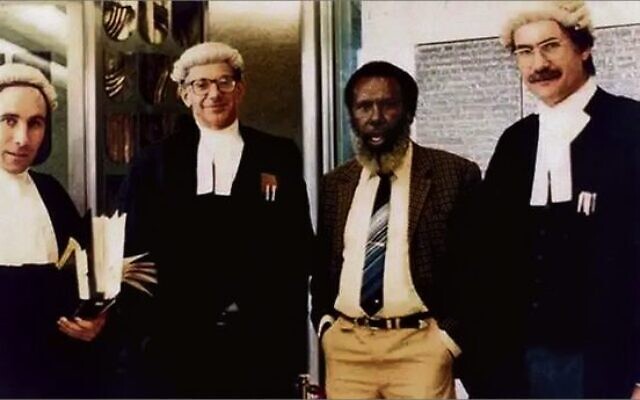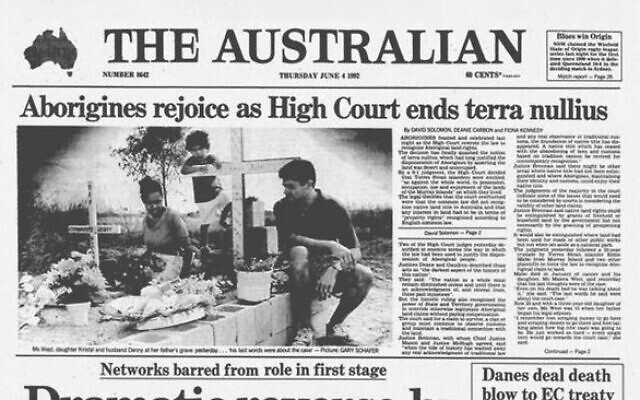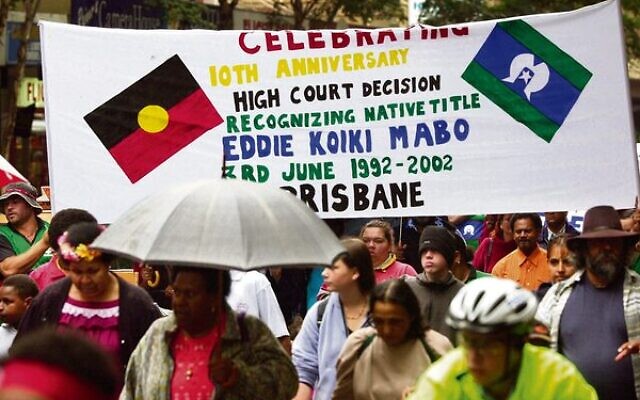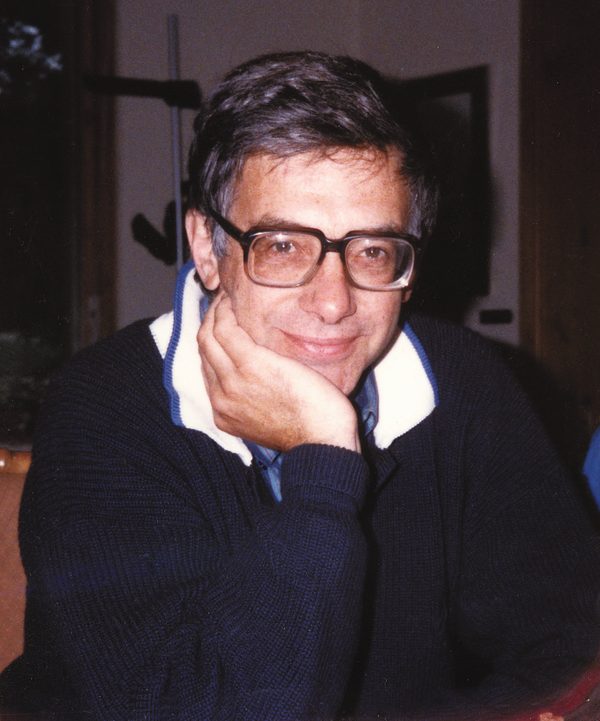On the history that preceded the Mabo case:
I think that an awareness of the reality of Aborigines in Australia came about, which did change the setting in which the whole question has been looked at.
My reaction about how it sort of has come about is to take as a starting point perhaps the Gove land rights case. There you had, back in 1970, a group of people who said we’re going to try and establish Native Title. What it did was acknowledge for the first time the reality of the Aboriginal relationship to land. He [Justice Sir Richard Blackburn] baulked at converting it into a legal entitlement. But if you leave that aside, the substance of what he said and wrote for the first time gave real legitimacy to the reality of those relationships to land that had never really been under scrutiny.
It had tremendous effect on me. I thought it was of enormous significance. I saw it as a great victory to have had a judge accept the substance of all of that, although I thought he was obviously wrong on the technical result.
The Racial Discrimination Act of 1975 and the Land Rights Act in 1976, they were really dramatic breakthroughs. Then you look at the judgements of the High Court over the next 15 years. Time and again, you see the judges asserting what Aboriginal interests in land are really all about. And they didn’t get around to saying until 1992 [that] it was recognised as a common law right. But the signs were leaping off the pages in my view.
Asked about emotional language in the Mabo judgement of Justice Sir Gerard Brennan:
The whole difficulty for this country has been that there has been this denial thing. Once you see the reality, how can you express it in any other terms? I find it amazing today, everybody knows in this country that there are people sitting out there now, in communities with raw sewage running across, and no streets and no lighting and no water.
There are third, fourth world conditions out there today. We should all be up in arms. This is the stuff which can only be described in words like disgraceful.
What we have in this country is a curious kind of blind spot, we’ve always had it in one form or another, we still have it.
I see stuff on television about the terrible conditions in towns in South Africa. I know Aboriginal communities which are far worse off than those shanty towns in South Africa. This country has a distinct capacity for blinding itself to its own problems.
When you say the language is unusual for High Court judges … I’m not sure how else you describe the fact that people are being put off their land.

Addressing the issue of terra nullius, which was overturned by the Mabo decision:
What we simply said [is] that’s not the correct position in English law, and there was no proper basis on which that had become, but not really held, or if it had been held in Australian law, it should be overruled.
I also put to them it’s just been assumed that it was such a doctrine, it’s become kind of like an urban myth almost that there’s such a thing as terra nullius. Where was it held that there was terra nullius? It’s never been actually decided.
We also argued a lot about the notion of what we call the abolition doctrine, because we took as our starting point, you take as a starting point that there is a pre-existing society with a set of rules and concepts of land. Given that they exist … how does the common law come to the point where it says suddenly they don’t exist? How do you get there? As a matter of law, you have to have a doctrine that somehow says that by virtue of the acquisition of sovereignty, that operates also as an extinguishment of the pre-existing interests in land.
When you come to look back at … the law relating to the acquisition of sovereignty in new territories, the British imperial doctrines that were developed from the 17th, 18th century on, that’s not what they say. It’s never been so held, except in Australia. Across New Zealand or Canada or America or any British colony, it has never been the way the law worked.
So why in Australia?:
Because of what happened here with settlers. The realities of what happened here … people treated the Aborigines as part of the local fauna, like the kangaroos, swept them off.
Victoria went from, it’s estimated,15,000 Aboriginal people by the turn of the century … by 1850, just down to a few hundred. It was a relatively quick extinction with massacres, and smallpox killed off large numbers of people.
So it [land rights] became irrelevant, it became a non-issue. And that’s what Brennan speaks of, it was not part of the law that created the extinguishment, it was the effect of dispossession. It’s because of the way Australia was settled. Because people went out there, out in the frontiers and just killed off people.

Mabo judgement on June 4, 1992.
Asked if he is saying Australia had a virtual, undeclared war for decades:
No question. And in many ways that war is still going on in the minds of certain groups. You think about the reaction, the anger and the fear about the Mabo decision in the early period there and all that controversy. I think it’s very much a war and very much a concept that you know, that’s the enemy. Aborigines are seen as the enemy, the alien, the other. They’re not just seen as people who are the descendants of first owners – obviously that’s shifting now.
And I make the point, this sort of [being] treated as they don’t exist, the point is best made … you look at the constitution. Don’t count them – not count them and then treat them in some special way or provide that they have a seat or not to have a seat – just don’t count them. It’s astonishing. It’s really quite remarkable when you sort of try and put it in perspective. And so you know, they’re not real people.
In country towns there are Aboriginal groups … they’ve lost the capacity to look after themselves. Why wouldn’t you then have local communities as well as the larger community say given that that’s the situation we have, we have to provide facilities, care, etc? We do that for all sorts of groups in the community and yet we still have that out there.
And that’s this warfare mentality, they’re not really part of us, they’re not really part of our community.
In many ways [Australia is] a very caring society, we have a social security system that’s far better than most in the world in terms of providing care and so on and so forth. This is one of the oddities that we’ve struggled, struggled to get to this point.
I must say, there’s a resonance in this for me. Each time I think about these things in the context of what’s happened to Jews in various societies over the centuries, they have been non-citizens, sort of outside – they’re there, but they sort of don’t count, they’re somehow hanging on the whim of a king or a leader or a ruler or something. But they’re not counted as part of the polity, the community.
Thoughts on recording the history:
These things take time to shift, given this background. There still isn’t much written about it. There’s very little history written of the Aboriginal–white relationships since 1945. Who’s actually analysed the communities, gone out there and found out?
[Aboriginal oral histories] are helpful and there’s a lot of those. Very, very important. But that has to be the precursor to the historians who will come and write the modern history of Aboriginal struggle, the modern history of Australia and its relationship with Aboriginal people.
And again, it’s interesting comparing with Jewish history. Jews are ‘people of the book’ and carried with us a written tradition, but it was portable. So, you can look at the expulsion from Jerusalem in 63 AD, after the Second Temple, you can say what happened is people [were] dispersed, they should have vanished. They didn’t vanish because they took the culture with them, rewrote it, and worked on it, and it was written. And then if they were dispersed from there, they picked up the books and took them and went somewhere else. Aboriginal culture is not a culture which has known writing.

Photo: AP Image/Dave Hunt
On Justice Sir Gerard Brennan’s use of the Racial Discrimination Act to link the judgement on the case, which dealt with Murray Island in the Torres Strait, with mainland Australia:
The case was argued at a level of generality. It was not argued solely in relation to Murray Island, It was argued on the principles of ‘what did the common law provide was to happen on the acquisition of new territory?’ Now, the answer to that is very simple and clear once you look at it, there is no automatic extinguishment.
You then get the question … you can decide whether or not there is an automatic extinguishment by classifying societies in some league rank, you can do a ladder. And that’s the point at which Brennan said well to do that involves a form of discrimination based on race or based on evaluating the merits of a culture, how similar they are to English law or English civilisation. So that’s discriminatory.
Therefore, once you eliminate that distinction, you then say you apply what I’ll call the prevailing English law position to whatever the community is. And Dawson, the dissenting judge, also proceeded on that basis. He accepted that whatever the doctrine was for Murray Island, would have to apply on the mainland.
On whether the idea that Aborigines are one people is fallacious:
Doesn’t exist. It’s a term of convenience, but it also has a significance. It’s of great significance for, say, Victorians to identify themselves as Aborigines given that they can no longer identify themselves as they properly should … they can’t, because all that’s been demolished, has been taken from them. So an Aboriginal identity is important.
And the other reason, which has its resonances in the Jewish experience, is the way in which they’ve in turn been labelled and dealt with. They were dealt with that way by white society. They’ve been characterised and so to speak, been given that identity, whether they want it or not.
They’re very split, they’re very divided, [but] at the same time they want to be identified as Aborigines. But within, internally, there are enormous divisions and still funnily enough, remnants of a very, very tight clan structure.
It’s the old story that they argue about in America, the greatest enemy that the Jews have is an absence of antisemitism. Or in Russia, how did Jews survive in Russia, because everybody identified them and abused them as Jews, even the ones who didn’t want to be Jews.
On what the Mabo judgement did for Aboriginal people themselves:
An enormous amount. It’s very important, even for people who don’t know what the judgement said or haven’t read any law. It’s completely shifted for very many people … it’s totally transformed their attitude, because they’ve struggled for years to have this acknowledgement of ownership of land, pre the arrival of the British, and even the most sympathetic of governments wouldn’t do it.
Grahame Leonard is a former president of the Executive Council of Australian Jewry, a former president of JNF Australia, and a former commissioner to the Victorian Multicultural Commission.
NOTE: These excerpts have been edited for length and flow purposes.


comments